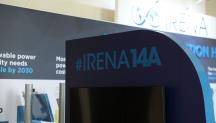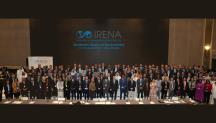.jpg?rev=1146fc9bd43d4c32bb0a6e058ffa1170&w=204&h=107&as=1&bc=ffffff&cc=1&hash=01F5FAA52F5AC68D1CFAFED1EDD36857)
.jpg?rev=1146fc9bd43d4c32bb0a6e058ffa1170&w=201&h=105&as=1&bc=ffffff&cc=1&hash=55EE88E2412420728B03886E484BC3F4)
Guide launched for national policy makers on renewable energy
Newsletter
The International Renewable Energy Agency (IRENA) has issued a handbook to help countries build up their clean energy capacity and meet their obligations under the United Nations Framework Convention on Climate Change (UNFCC).
IRENA released the handbook on Nationally Appropriate Mitigation Actions, or NAMAs, on 29 November at COP 18, the UN Climate Change Conference in Doha, Qatar. NAMAs are fast emerging as a valuable instrument for countries to control CO2 emissions. Following such guidelines could also help to unlock funding for renewable energy development.
The “IRENA Handbook on Renewable Energy Nationally Appropriate Mitigation Actions (NAMAs) for Policy Makers and Project Developers” demonstrates how the guidelines can help developing countries to remove barriers to renewable energy deployment.
“NAMAs present an opportunity for many developing countries for a transition to sustainable energy production and consumption,” said Hugo Lucas, IRENA’s Director of Policy Advisory Services and Capacity Building.
The handbook includes three case studies that illustrate the potential of NAMAs in countries of varying size: Peru, Kenya and Grenada.
“For a small island country like Grenada, NAMAs present an opportunity for an energy transition, where the benefits are not on climate change mitigation but on energy security, and employment creation,” said Hugh Sealy, Associate Professor of the St. George’s University of Granada. “Grenada has the ambition to go from 99 per cent fossil to 100 per cent renewable. And NAMAs could be the definitive source of finance for this energy transition.”
IRENA and the Spanish Office of Climate Change launched the handbook jointly at a joint side-event at COP 18 with over 100 participants in attendance for a panel discussion on NAMAs.
“Countries that have succeeded in developing renewable energy on a large scale have followed a comprehensive programmatic approach,” said panelist Axel Michaelowa, Senior Founding Partner at Perspectives, adding: “There are two key issues for successful NAMAs: country engagement and money; indeed a finance source is the most important aspect and the one currently missing, but that guaranteed, NAMAs can really be a catalyzer for policy changes.”




